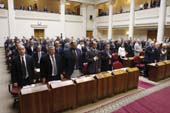Dodging protest, new parliament convenes
By Mikheil Svanidze
Monday, June 9

President Mikheil Saakashvili formally scheduled the session the night before.
The move caught the opposition off-guard. They had planned a demonstration for the next day to hassle or obstruct MPs-elect as they arrived for the first session, after hearing—in an apparent government feint—that parliament would convene on June 9.
When the real date became public, a leader of the eight-party United Opposition bloc, Levan Gachechiladze, went on pro-opposition Kavkasia TV to ask supporters to rally that night and keep vigil outside parliament.
“I am calling all Georgians for a rally to stop this illegitimate parliament from convening,” Gachechiladze said before abruptly walking off the set, leaving a surprised host and guest, former president Eduard Shevardnadze.
But the opposition failed to gather enough people to blockade parliament or even to form the promised “corridor of shame” for MPs-elect to pass through as they entered parliament.
Around a thousand gathered at night, with riot police and water cannons idly standing by. By the time MPs-elect came to take their seats early in the morning, only a few dozen protestors remained to loudly protest their arrival.
Inside, President Mikheil Saakashvili opened the inaugural session by thanking the previous parliament for its work, and telling the ruling majority to make good use of its mandate.
The ruling party won an overwhelming share of parliament, prompting an opposition boycott. Just a few defecting MPs elected on opposition tickets showed up for the session, though the Christian Democratic Movement, which won the third-highest share of the vote in the May elections, say they will eventually take their seats.
Saakashvili urged unity and an inclusive government.
“All of our citizens should feel like they’re part of this country’s governing process,” he said.
But outside the parliament building, leading opposition politicians who won seats in parliament were symbolically cutting up their lawmakers’ ID cards.
Earlier their supporters shouted at policemen and ruling party MPs, calling them criminals and traitors. “Where are you from?” demanded one opposition campaigner. “Are you Georgian?”
Catholicos-Patriarch of All Georgia Ilia II, after joining the president to preside over the opening of parliament, came outside to speak briefly to demonstrators.
“There is only one Georgian nation and it is united. God unites and the Devil divides,” he told them.
Davit Bakradze, who was top of the National Movement’s party list, was chosen to be speaker of parliament as expected.
Addressing the newly-convened parliament, he made overtures of reconciliation and power-sharing to the opposition.
Bakradze offered to give an opposition MP the post of vice-speaker, and to make it easier for them to form their own factions in parliament.
“This is not a full list [of proposals],” Bakradze said. “We expect proposals from them as well; proposals that will serve the purpose of having full-scale representation of the opposition in this parliament… We expect cooperation from them.”
The Christian Democrats, the only opposition party so far to reject a boycott of parliament, said they will sit down with the government to discuss power-sharing agreements.
Newly-elected Christian Democratic MP Magda Anikashvili told the newspaper they would, among other demands, seek guarantees that the opposition be consulted before constitutional changes, deputy chairmanships for committees and opposition control of financial oversight.
She said the Christian Democrats would consult with other opposition parties.
The ruling National Movement won 119 out of 150 seats in an election international observers said was not completely democratic but an improvement over the January presidential poll.
The United Opposition won 17 seats, with Labor and the Christian Democrats each taking six. The moderate Republicans took two seats in local voting, but the MPs running on their ticket have broken with party leadership over boycott plans.
